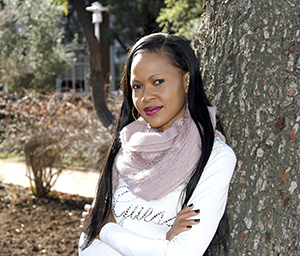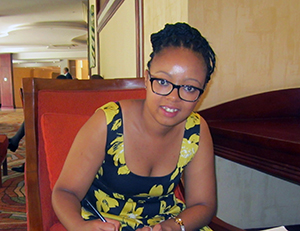Latest News Archive
Please select Category, Year, and then Month to display items
01 January 2020
|
Story Eugene Seegers
|
Photo Kaleidoscope Studios | Sonia Small
 Dr Maria Madiope took over the reins of the UFS South Campus at the beginning of January 2020.
Dr Maria Madiope took over the reins of the UFS South Campus at the beginning of January 2020.
The Council of the University of the Free State (UFS) approved the appointment of Dr Maria ‘Marinkie’ Madiope as Principal of the South Campus for Open Distance Learning (ODL) during a meeting held on 20 September 2019. Dr Madiope took over the reins of the UFS South Campus at the beginning of January 2020.
Educator at heart
Educating and empowering others are key aspects of Dr Madiope's life. She has served as the Director for University Teaching and Learning at Unisa since 2015 and takes her role incredibly seriously, achieving a transformative curriculum at the colleges under her care since her appointment.
Dr Madiope holds a PhD in Education from Unisa, with a specialisation in Didactics; her next two degrees where completed at the then RAU, which is today known as the University of Johannesburg: a BEd in 1999, followed by an MEd in 2001, both specialising in Computer-based Instruction. She previously obtained her BA Ed in 1985 and a BEd in 1988 from the University of the North. Her initial training as a teacher was from the Hebron College of Education from 1980-81.
Dr Madiope is also the editor of the only journal in ODL, Progressio, since 2016. Her expertise in E-learning is another of her strong points. Together with her team, Dr Madiope designed and developed the first online course in Curriculum Transformation, which is being piloted at Unisa. Her work has been rewarded with awards such as the Unisa Gender Activism: Advocacy and Promotion of Women’s Rights 2013, Unisa Woman of the Year 2013, and Unisa Best Performer 2013.
Dr Madiope brings with her a wealth of experience to UFS and her vision is to increase access to a wider base of learners with potentially having more African learners enrolled. The first point of call would be to have more learners coming from Lesotho and then the rest of the SADEC region, having the UFS become a leading distance-learning university. One of the key projects that Dr Madiope wishes to tackle is early childhood development. “I believe in educating educators to ensure that they are best equipped to provide the latest and relevant Early childhood and development practices that are on par with the rest of the world,” she says.
Community leader
In addition to being an experienced educator and administrator, Dr Madiope is instrumental in community projects that lie close to her heart. Whether it is large-scale advocacy for women’s rights or her personal involvement in the supply of sanitary towels for schoolgirls as part of a programme to empower the girl child through exposing them to options, it is humbling to watch her compassion in action.
She further intends to strengthen the relationship of the university with TVET Colleges and community colleges by providing mutually beneficial programmes that will up-skill those colleagues by giving them an opportunity to work with experienced UFS staff members. She says, “Reaching out to colleagues in TVET and Community colleges will offer them the opportunity to advance their lecturing and learning programmes, which will only lead to benefiting their learners and South Africa as a whole.”
Trauma, Forgiveness, and Reconciliation Studies attracts global attention
2016-06-27

Lerato Machetela is on her way to
Ghent University in Belgium where
she will spend 10 months working
alongside experts in the field of
historical trauma.
Photo: Eugene Seegers
Research excellence is one of the major driving forces at the core of the University of the Free State (UFS). This striving for academic distinction has found embodiment within Trauma, Forgiveness, and Reconciliation (TFR) Studies. Headed by Research Fellow and Senior Research Professor Pumla Gobodo-Madikizela, the research unit is raking in achievements consistently.
Cornell University Distinguished African Scholar Award
Leading by example, Prof Gobodo-Madikizela received the prestigious 2016 Distinguished African Scholar Award from Cornell University recently. Being honoured with this award affirms an unusual depth of knowledge and experience in a field related to the recipient’s own work. Through this award, Prof Gobodo-Madikizela is now also affiliated with the Institute for African Development and the Psychology Department at Cornell University.
Ghent University fellowship in historical trauma
Another member of TFR has caught international attention. Lerato Machetela – a PhD student at the research unit – received an invitation from scholars at Ghent University in Belgium. Machetela will leave in September, where she will spend ten months in Ghent with experts in the field of historical trauma. She will be affiliated to their university’s Cultural Memory Studies Initiative and the Psychology Department. When Machetela submitted her PhD proposal on transgenerational transmisison of trauma among the youth in Jagersfontein to the UFS Psychology Department panel, “it was hailed as a unique project, and a first for the department,” Prof Gobodo-Madikizela says.

Naleli Morojele conducting the research
in Rwanda that has formed the basis of
her new book, Women Political Leaders
in Rwanda and South Africa: Narratives
of Triumph and Loss.
Book explores triumph and loss of female political leaders
TFR cultivates thriving authors actively, the latest being Naleli Morojele, who is pursuing a PhD in the field of Political Studies. Soon, Morojele will be launching her book, Women Political Leaders in Rwanda and South Africa: Narratives of Triumph and Loss. Through the stories of significant female Rwandan and South African leaders, the reader gains insight into these women’s early-life experiences, struggles, and successes. Perhaps even more pertinently, Morojele’s book also exposes the ways in which gender inequality still works to smother their roles as citizens and politicians.